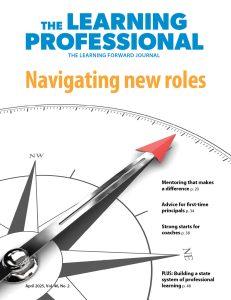As most readers know, I live in Texas. My elected representatives are quite conservative on issues related to federal involvement in education.
Their point of view is grounded in the U.S. Constitution, which places control over education firmly in the hands of states. It also finds expression in the bipartisan Every Student Succeeds Act (ESSA), which reversed what many saw as the No Child Left Behind Act’s efforts to assert federal control over everything in K-12 education, from school accountability measures to definitions of highly qualified teachers.
However, elected representatives on both sides of the aisle recognize that the federal government can and should help improve K-12 education by providing funding to ensure that all students receive an appropriate education.
Title IIA, a program that supports educator recruitment, training, mentoring, and induction via poverty-weighted formula grants, represents one serious effort by the federal government to ensure that every student has access to well-trained teachers every day. All of us at Learning Forward believe that Title IIA’s annual investment in teachers is vital, and we are working hard to make sure that Congress and the Administration understand this program’s value and support funding it adequately. From my perspective, proposals to deeply cut or eliminate Title IIA, which Congress is currently mulling, would be devastating.
To protect Title IIA, though, it became clear to me that I needed to better understand the points of view of my elected representatives and how those perspectives translate into their policy positions. Without understanding and valuing their positions, it would be impossible to communicate the importance of saving Title IIA in ways that may resonate with them. Perhaps you have similar circumstances where you live. If so, the following may be helpful to you.
I began by contacting each representative by phone and email. Only one of my elected congresspersons responded specifically to my messages. Here are segments of their responses:
“Dear Stephanie:
“Thank you for contacting me regarding funding for Title II of the Every Student Succeeds Act (ESSA). I appreciate hearing from you and having the benefit of your views.
“As you may know, on December 10, 2015, the Every Student Succeeds Act (ESSA) became Public Law 114-095. The passage of this law represents the first major reform in the Elementary and Secondary Education Act (ESEA) since the disastrous No Child Left Behind Act — which I voted against — passed in 2001. The Every Student Succeeds Act included major reforms to stop Washington from imposing Common Core or any other academic standards on states. ESSA is the first step in reversing the failed policies of No Child Left Behind, and I am proud to have supported this important legislation that removes any federal intimidation for schools to adopt Common Core or any other intrusive federal programs.
“Throughout my tenure, my votes in Congress on education policy have focused on increasing the role of parents in the day-to-day education of our children and decreasing the role of Washington bureaucrats. Congress should only support education bills that force the federal government to remove itself from the business of education and shift the power back to state and local authorities who know what is best for their children in their communities. I will continue to support the ESSA and any other legislation that reduces unnecessary federal involvement and puts states and local authorities back in control of their education systems.
“As Congress continues to debate appropriate levels of funding for various agencies and programs, please know that I will keep your concerns for Title II of the ESSA in mind.”
One added me to his weekly updates, which included the following statement:
“This historic tax reform bill will be a boon to working families across the country by doubling the child tax credit — from $1,000 a child, to $2,000 a child — and by the inclusion of my Student Opportunity Amendment in the final bill, an amendment which expands 529 College Savings Plans by allowing parents to now save up to $10K per year per child to use for K-12 education expenses in public, private, and religious schools.”
Both responses gave me a better understanding of my representatives’ perspectives on public education, which helped me formulate new arguments to garner broad support for Title IIA.
My arguments for Title IIA focus on:
- The limited role of the federal government in day-to-day education;
- The idea that the federal government retains a responsibility to make sure that all students receive an appropriate education;
- The bedrock concept that any federal education funding requirements were developed on a bipartisan basis and reflect research-based practices;
- Analogies between the needs and practices of businesses/other fields and education; and
- Most importantly, the overarching importance of a well-educated citizenry to the nation as a whole.
Here are my arguments.
1. An educated citizenry is a nation’s most powerful defense against its enemies.
Investing in education is equivalent in importance to investing in our nation’s defense. We live in a globally competitive world, both economically and militarily. Freedom and democracy are the core concepts that ensure our nation’s independence and strength. Public schools exist to ensure the understanding and promulgation of these core concepts.
Our federal government has a responsibility to ensure that all students — no matter their Zip Code — have access to a quality education that prepares them for success as a global citizen. Federal investments in public education are weighted to support those communities that have the greatest need and where more substantive support is necessary to achieve the desired ends for all.
2. States have primary responsibility for education while the federal government provides resources to help ensure that each student has access to an appropriate education.
States take their responsibility for public education seriously. States and municipalities provide the vast majority of funding for education and establish policies, including systems of accountability, to ensure that every child has access to a quality education. With these checks and balances in place, parents have a right to expect that their neighborhood school is a good school.
States and school systems rely on federal funding of Title II to fulfill their promise to the neighborhoods that have the greatest challenges in supporting and retaining good teachers. Title II dollars in these schools provide mentors for new principals and teachers and classroom-based support that helps teachers improve their practice.
3. Expertise in teaching, like in medicine, evolves through learning, coaching, and mentoring.
Our interns and early career doctors do not have the same level of knowledge and skill as our doctors and specialists who have been practicing medicine for many years. Early career doctors proceed through a series of career stages (intern, resident, practitioner), often in teams, with supervision from more experienced colleagues. Through a combination of coursework and real-world practice, they demonstrate their readiness to practice on their own.
Too often today, early career teachers find themselves assigned to the most challenging classrooms in urban and rural communities. Mentoring and coaching are essential to helping them address the great diversity of challenges they face. Research has demonstrated that, implemented effectively, supports such as mentoring and coaching accelerate competence and increase retention of our most vulnerable early career teachers. Title IIA provides funding to ensure that early teachers experience this type of support.
4. Every child deserves great teaching every day — and Title IIA’s investment in team-based professional learning brings it closer to reality.
A bipartisan group of senators and representatives worked for almost a decade to improve the quality of professional development — and hence raise the quality of teaching — by refining ESSA’s professional development definition.
Thanks to their efforts, the law now lays out the expectation that Title IIA’s investments in professional development be focused at the school level (in contrast to workshops and courses, which research has shown to be less effective), occur among teams of teachers to develop collective expertise, and require accountability for all students in their grade level or subject matter.
Without Title IIA funding to put these core ideas into practice, the quality of professional development and the quality of teaching, particularly in states and districts with the greatest need, may not improve.
5. Investing in support for school principals is critical to keeping neighborhood schools strong.
It is impossible to find a successful turnaround story without a great principal. A principal’s job is comparable to a CEO of any complex company. A principal is responsible for operations, finance, human resources, programs and services, facilities and grounds, security, stakeholders (parents and communities), employees, and customers (students). In most schools, principals handle this entire list of responsibilities with little or no administrative support. This is not comparable to most complex businesses.
Title IIA, which allows states to use up to 3% of their allocations to fund professional development geared specifically toward principals, is one of the few new funding sources that states will be able to use to support their principals. While dollars for professional learning are often the first to be on the chopping block during challenging financial times, support for principals rarely shows up on any budget. Many states and districts cannot afford and do not invest in recruiting, training, and retaining their principals. Title IIA’s investments in the leaders of our nation’s schools gives us the best chance of every student attending a great school.
One of Stephen Covey’s most quoted lessons is “Seek first to understand.” I am trying to do that with sincerity and listen to policymakers’ points of view. At the same time, I know the damage that will occur in school systems and classrooms across the country if we don’t address defunding Title IIA, which I feel would be a threat to our schools and our nation’s education system.
I implore you to join me in garnering the support we need to keep Title IIA funding. Just as important, I ask you to make the most serious commitment you have ever made to professional learning — to do it right and document its impact. Tell a story that matters and others will want to see success replicated in classroom after classroom. Not until then will we know our support is secure.
About the author
Stephanie Hirsh is executive director of Learning Forward.



![Poil blog v1[1]](https://learningforward.org/wp-content/uploads/bb-plugin/cache/poil-blog-v11-custom_crop.jpg)




